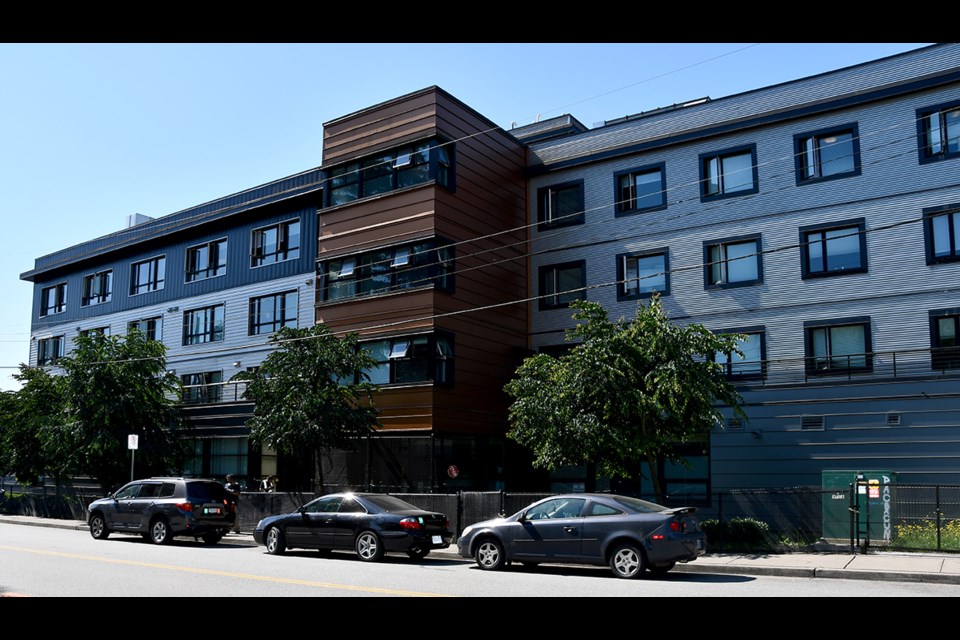The Tri-Cities’ homeless challenges are "predictable," says the MLA whose constituency covers the shelter and transitional housing at 3030 Gordon Ave. in Coquitlam.
Coquitlam–Maillardville Independent MLA Selina Robinson told the Tri-City News on Monday, July 15 — the same day Coquitlam city council spoke about the lack of provincial resources for 3030 Gordon Ave. — that she warned the cities of Coquitlam, Port Coquitlam and Port Moody in 2017, two years after the facility opened, that more civic land was needed and rezoned to accommodate more supportive housing for vulnerable people.
But “all three cities have been dragging their feet,” Robinson said. “We need four or five additional smaller facilities around the Tri-Cities […] and none have stepped up.”
Robinson, who was on Coquitlam city council when it voted to offer civic property for BC Housing to build the hub, said other B.C. municipalities, like Vernon, have partnered with the provincial government to house their homeless populations, but the Tri-Cities and Langley have stalled on supportive housing since 2017.
As a result, “It’s going to continue to be a pressure cooker” at 3030 Gordon Ave., she said. “BC Housing isn’t going to buy a property unless they know the city is a partner."
A homeless shelter is out of control. Coquitlam wants action https://t.co/4JmYV5Vwcf
— Tri-City News (@TriCityNews) July 12, 2024
Her comments come as BC Housing also called on the three municipalities to act.
“Local governments and the Province must work together to increase capacity, strengthen collaboration and acknowledge that all communities and neighbourhoods have a role to play in addressing the impacts of homelessness,” the agency told the Tri-City News today, July 16.
What council said
Robinson's and BC Housing's statements conflict with sentiments raised at Coquitlam council, which on Monday unanimously voiced its frustration with the province to provide wrap-around services — i.e., mental illness and addictions supports — for the unhoused at 3030 Gordon Ave.
Coun. Brent Asmundson, who, like Robinson, advanced the shelter proposal a decade ago, suggested Coquitlam won’t move on more supportive housing until the provincial government, BC Housing and Fraser Health provide the appropriate level of care at 3030 Gordon Ave.
“The situation keeps getting worse,” Asmundson said, noting the challenges started when the Vancouver-based RainCity Housing was picked as the operator of 3030 Gordon Ave. instead of the Port Coquitlam-based Hope For Freedom Society.
Now, Asmundson said, the public has lost trust with the government levels finding a solution.
“If I had known what I know today, I would never have approved the shelter in our community,” he said, adding he is upset by the finger-pointing and lack of supports.
Coun. Dennis Marsden, a former BC Liberal candidate for MLA, called 3030 Gordon Ave. “an abysmal failure” and placed the blame on RainCity as well as NDP Premier David Eby, while Coun. Trish Mandewo, the president of the Union of BC Municipalities (UBCM), recommended Coquitlam voters make their views known at the ballot box this fall.
“We are asking the province to honour their commitments for wrap-around services and to help those in need,” said Coun. Steve Kim, also a former BC Liberal MLA candidate. “The time for action is now. Words mean nothing at this point.”
Retorted Stewart, “The time for action was seven years ago but now would be fine, too.”
Stewart and several council members cited the Tri-City News’ recent letters to the editor about 3030 Gordon Ave., some describing the neighbourhood impacts to residents and businesses.
Letters: Readers speak out about Coquitlam's homeless shelter https://t.co/yowB8Eb79z
— Tri-City News (@TriCityNews) July 15, 2024
Andrew Merrill, Coquitlam’s general manager of planning and development services, told council how 3030 Gordon Ave. has become a drain on civic resources with police, fire and bylaw enforcement officers attending the hub daily; staff also clean up the area.
In a letter to Ottawa and Victoria that's due be sent out this month with Mayor Stewart's signature, Coquitlam is specifically calling for:
- stable provincial funding for services to support the unhoused/street entrenched
- including healthcare, overdose prevention services, outreach and peer support and referrals to provincial agencies for other supports (i.e., income assistance, housing and access services)
- support for the Tri-Cities’ community-based, coordinated response to homelessness
- through the Tri-Cities Homelessness and Housing Task Group with permanent funding and resources
- provincial funding and improved management of operational impacts around 3030 Gordon Ave.
- in line with the Good Neighbour Agreement that was established when the shelter was provided
- establishment of a day-time hub within the Tri-Cities
- funding and framework for more and improved shelter and housing services
- increased coordination between BC Housing and other ministries and government agencies
- recognizing that homelessness is a complex issue with individuals often requiring other health and social supports to address the underlying causes of homelessness
“We are advocating till the cows come home for the province to do their job,” Coun. Teri Towner said. “We’re having to respond to other levels of governments' shortcomings.”
“It’s quite simple,” Coun. Robert Mazzarolo concluded. “Province: Do your job. It’s your responsibility. It’s your purview.”





